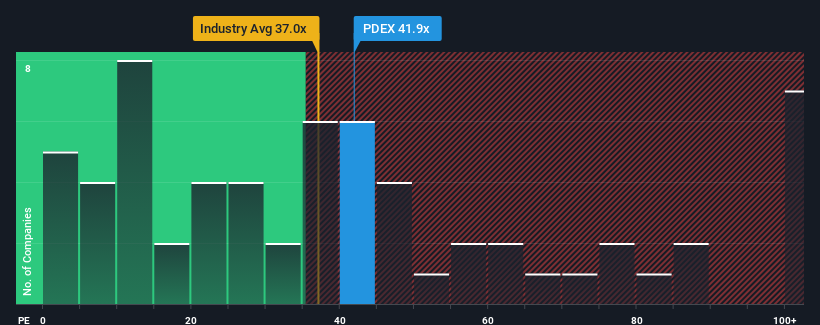- United States
- /
- Medical Equipment
- /
- NasdaqCM:PDEX
Pro-Dex, Inc.'s (NASDAQ:PDEX) P/E Is Still On The Mark Following 37% Share Price Bounce
The Pro-Dex, Inc. (NASDAQ:PDEX) share price has done very well over the last month, posting an excellent gain of 37%. Looking back a bit further, it's encouraging to see the stock is up 61% in the last year.
After such a large jump in price, given close to half the companies in the United States have price-to-earnings ratios (or "P/E's") below 17x, you may consider Pro-Dex as a stock to avoid entirely with its 41.9x P/E ratio. Nonetheless, we'd need to dig a little deeper to determine if there is a rational basis for the highly elevated P/E.
With earnings that are retreating more than the market's of late, Pro-Dex has been very sluggish. It might be that many expect the dismal earnings performance to recover substantially, which has kept the P/E from collapsing. You'd really hope so, otherwise you're paying a pretty hefty price for no particular reason.
View our latest analysis for Pro-Dex

What Are Growth Metrics Telling Us About The High P/E?
There's an inherent assumption that a company should far outperform the market for P/E ratios like Pro-Dex's to be considered reasonable.
Retrospectively, the last year delivered a frustrating 69% decrease to the company's bottom line. This means it has also seen a slide in earnings over the longer-term as EPS is down 61% in total over the last three years. So unfortunately, we have to acknowledge that the company has not done a great job of growing earnings over that time.
Turning to the outlook, the next year should generate growth of 134% as estimated by the one analyst watching the company. That's shaping up to be materially higher than the 15% growth forecast for the broader market.
With this information, we can see why Pro-Dex is trading at such a high P/E compared to the market. It seems most investors are expecting this strong future growth and are willing to pay more for the stock.
The Key Takeaway
The strong share price surge has got Pro-Dex's P/E rushing to great heights as well. Generally, our preference is to limit the use of the price-to-earnings ratio to establishing what the market thinks about the overall health of a company.
We've established that Pro-Dex maintains its high P/E on the strength of its forecast growth being higher than the wider market, as expected. Right now shareholders are comfortable with the P/E as they are quite confident future earnings aren't under threat. Unless these conditions change, they will continue to provide strong support to the share price.
We don't want to rain on the parade too much, but we did also find 3 warning signs for Pro-Dex that you need to be mindful of.
It's important to make sure you look for a great company, not just the first idea you come across. So take a peek at this free list of interesting companies with strong recent earnings growth (and a low P/E).
New: Manage All Your Stock Portfolios in One Place
We've created the ultimate portfolio companion for stock investors, and it's free.
• Connect an unlimited number of Portfolios and see your total in one currency
• Be alerted to new Warning Signs or Risks via email or mobile
• Track the Fair Value of your stocks
Have feedback on this article? Concerned about the content? Get in touch with us directly. Alternatively, email editorial-team (at) simplywallst.com.
This article by Simply Wall St is general in nature. We provide commentary based on historical data and analyst forecasts only using an unbiased methodology and our articles are not intended to be financial advice. It does not constitute a recommendation to buy or sell any stock, and does not take account of your objectives, or your financial situation. We aim to bring you long-term focused analysis driven by fundamental data. Note that our analysis may not factor in the latest price-sensitive company announcements or qualitative material. Simply Wall St has no position in any stocks mentioned.
About NasdaqCM:PDEX
Pro-Dex
Designs, develops, manufactures, and sells powered surgical instruments for medical device original equipment manufacturers worldwide.
Solid track record with adequate balance sheet.
Market Insights
Weekly Picks


Crazy Undervalued 42 Baggers Silver Play (Active & Running Mine)


Fiducian: Compliance Clouds or Value Opportunity?

Willamette Valley Vineyards (WVVI): Not-So-Great Value
Recently Updated Narratives

THE KINGDOM OF BROWN GOODS: WHY MGPI IS BEING CRUSHED BY INVENTORY & PRIMED FOR RESURRECTION


The "Molecular Pencil": Why Beam's Technology is Built to Win


ADNOC Gas future shines with a 21.4% revenue surge
Popular Narratives


MicroVision will explode future revenue by 380.37% with a vision towards success


NVDA: Expanding AI Demand Will Drive Major Data Center Investments Through 2026




